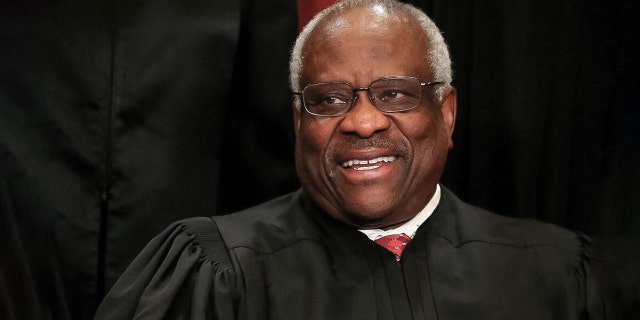Thomas dissents in military rape case, says Supreme Court should allow military members to sue government

Lawyer for family of slain Texas soldier Vanessa Guillen: ‘I thought I’d seen it all until I went to Fort Hood’
Fox Nation host Nancy Grace interviews Guillen family attorney Natalie Khawam in Fox Nation’s A Fort Hood Investigation with Nancy Grace: Part 1.’
Justice Clarence Thomas on Monday dissented from the Supreme Court’s decision not to hear the case of a West Point cadet who says she was raped and wants to sue the federal government alleging it didn’t do enough to prevent sexual assault on campus.
The woman, referred to as Jane Doe in the case Jane Doe v. United States, was not allowed by lower courts to sue the government because of a 1950 Supreme Court precedent. In that case, the court ruled that members of the military can’t sue the government under the Federal Tort Claims Act.
Doe’s appeal to the Supreme Court failed when the court refused to take up her case Monday. But Thomas disagreed with his colleagues, writing that the 1950 case was wrong and that the court should have taken up the case and overturned it, allowing the woman’s claim to proceed.
Thomas said the law’s small “carve out for military-related claims: those ‘arising out of… combatant activities… during a time of war,'” was clearly not meant to apply to a situation like a sexual assault at a military academy.
Justice Clarence Thomas, who has made clear in recent years he has no qualms about overturning past cases he thinks were decided incorrectly, advocated for the court to overturn another precedent on Monday. This time, he said the Supreme Court should overturn a 1950 case that is barring a West Point cadet who says she was raped from suing the government.
(Reuters/Jonathan Ernst)
Therefore, Thomas said, the 1950 case called Feres v. United States and by extension Doe’s case were wrongly decided.
“Under our precedent, if two Pentagon employees— one civilian and one a servicemember—are hit by a bus in the Pentagon parking lot and sue, it may be that only the civilian would have a chance to litigate his claim on the merits,” Thomas wrote. “Nothing in the text of the Act requires this disparate treatment.”
The dissent from Thomas comes amid increasing momentum in Congress and among activist groups to increase protections against sexual assault in the military, with many citing alarming reports of widespread sexual violence. Five separate groups of activists weighed in supporting Doe with briefs to the Supreme Court before it refused to take up the case Monday.
Plus, a bipartisan group of senators last week introduced a bill to change how the military handles sexual assault. The coalition included Sen. Kirsten Gillibrand, D-N.Y.; Chuck Grassley, R-Iowa; Richard Blumenthal, D-Conn.; Ted Cruz, R-Texas; and Mark Kelly, D-Ariz.
“Sexual assault in our military is an epidemic and it’s clear that the current system is not working for survivors. Despite repeated efforts to protect our women and men in uniform rates of harassment and assault continue to rise while prosecutions decline,” Gillibrand said in a statement.
“As a former combat commander and a survivor of sexual assault, I understand the traumatic experiences too many of our service members have faced,” Sen. Joni Ernst, R-Iowa, also a co-sponsor of the bill, added. “Sexual assault has no place in our military—or anywhere else—and it’s far past time we take more steps toward preventing and reducing these heart-wrenching crimes.”
According to Gillibrand’s office, nearly 21,000 military members were sexually assaulted in 2018.
Thomas said Monday that the Supreme Court should at least take up Doe’s case to “clarify the scope of the immunity we have created” but advocated going a step further to fully overturn Feres.
The longest-serving justice has become more vocal in recent years about the fact he has no qualms about overturning precedent he believes is wrong, as other justices continue to defer to precedent in most cases.
Thomas has specifically said on multiple occasions he thinks the court should take up a challenge to Roe v. Wade, the ruling that created a right to an abortion, and overturn it. That is despite the fact even other conservative-leaning justices appear reluctant to do the same, given how embedded it’s become in law and how many rely on the ruling to this day.
CLICK HERE TO GET THE FOX NEWS APP
“Perhaps the Court is hesitant to take up this issue at all because it would require fiddling with a 70-year-old precedent that is demonstrably wrong,” Thomas wrote of the Feres case on Monday. “But if the Feres doctrine is so wrong that we cannot figure out how to rein it in, then the better answer is to bid it farewell.”
Thomas then cited many other times the Supreme Court has overruled its past cases, including Brown v. Board of Education, which overruled Plessy v. Ferguson.
In 2019, Thomas advocated that the Supreme Court revisit Feres in the case of a man who sued the government after his wife died of complications from childbirth in a naval hospital. Late Justice Ruth Bader Ginsburg also said the court should have let the man’s case proceed.
No other justices joined Thomas on Monday in dissenting from the court’s decision not to take Doe’s case.
Source: Read Full Article


